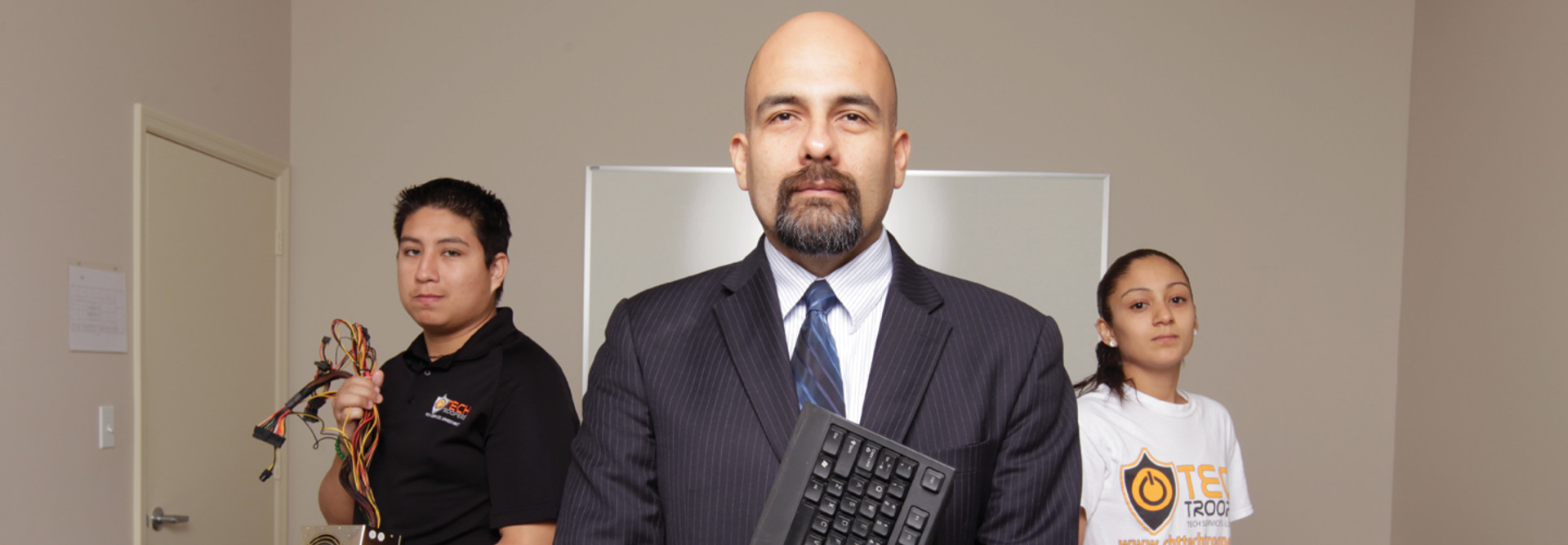Service-Learning Opportunities Provide Real-World Tech Experience for College Students
The Tech Troopers program at Miami's College of Business and Technology — known as CBT College — was started three years ago, borne out of necessity: The IT department had its hands full managing network expansion projects at new campuses. The School of Technology assigned students to help with tasks at a level they could handle. Working closely with employees, the students developed critical skills while the IT team received crucial help with its growing list of projects.
The program worked so well that Tech Troopers soon began repairing faculty and staff computers under the supervision of IT employees, and CBT expanded the program to its Digital Graphic Design program. About a year ago, Tech Troopers began offering services to small businesses in the surrounding community.
Today, Tech Troopers students repair hardware and software, manage networks and create websites, business cards, logos and postcards. They have also created a virtual art gallery and provided remote desktop support for a duty-free company with four international offices.
As demand grows for highly skilled IT workers, colleges and universities now look to provide experiences beyond classrooms and labs, offering students more supervised opportunities to work on real-world projects for actual businesses.
Such service-learning programs and internships help students to practice skills they've gained in the classroom and provide practical work experience for their résumés.
"There's incentive for students to really go the extra mile," says CBT Executive Director Luis Llerena. "They're motivated."
A Technology Win-Win
The college has turned the Tech Troopers program into a business model, offering services to the community at rates far below market value, Llerena says. Students receive hands-on training, businesses obtain affordable technology assistance and CBT brings in the funding that helps it to meet government requirements.
"We turned a challenge into an opportunity of hands-on training for students, the community and the school, so essentially everybody wins," Llerena says.
As graduates compete fiercely in a crowded job market, Llerena says, Tech Troopers participants are given a leg up thanks to their experience.
"In a class, you're not going to get the variety of challenges that you would in the real world," he says. "This is definitely a résumé builder."
Real-World Experience and Results
When Vanessa Cerpas entered CBT in 2010, she says her dream of working as a graphic designer was outweighed by her fear of fitting into corporate culture. She worried that she wouldn't be able to meet the demanding expectations and deadlines of a workplace.
"I always feared the real world," Cerpas says.
When she heard about CBT's Tech Troopers program, she says she jumped at the opportunity to participate. Once given the chance to sit at her own desk in an office and work with a team to create promotional materials, business cards and websites, she knew she had what it takes to be a corporate graphic designer.
Percentage of students who participated in service-learning programs during the 2011–2012 academic year, contributing about $9.7 billion to their communities
SOURCE:Creating a Culture of Assessment (Campus Compact, 2012)
Cerpas says the team-based structure provided a confidence boost: She was able to learn from other graphic designers, while also knowing she had their support and experience to fall back on.
"I didn't struggle at all," she says. "I had a team, and they helped me out."
Tech Troopers took a while to catch on, but today it is a competitive offering, Llerena says, and students must meet several criteria to be accepted.
"It's very important that those who do participate are truly at the top of their game," he adds, otherwise their customers could suffer negative impacts.
Reaching Out to the Community
Six years ago, Indiana University of Pennsylvania (IUP) Associate Professor Azad Ali had similar thoughts while preparing a course in web design: Why not have students create websites for organizations that need them? "It provides a valuable learning experience to the students. It takes them out of college classrooms and textbooks and gives them valuable practical experience," says Ali, who works in the Department of Technology Support and Training within IUP's Eberly College of Business and Information Technology. "It also provides a service to the community."
He shared his idea with IUP's office of service learning, which emailed its database of nonprofit organizations. The first semester, 11 organizations said they could use help creating new websites or updating existing ones.
"We finished all 11 projects," Ali says, and organizations were invited to view and give feedback on the student presentations at the end of the semester.
Today, Ali continues to offer a service-learning component with his capstone course, but students are no longer limited to web design. Past student projects have created and sorted data from an online survey for a county agency; built a database for a nonprofit to track volunteers; and taught senior center residents how to use email and the Internet.
Ali works closely with his students to ensure they're on track. He meets with representatives from the organizations first to determine their needs before translating those requirements to his students. He then invites those representatives to visit his class and explain their projects themselves. Students work on projects in groups of two or three and provide periodic updates on their progress to the class.
"When I see that one group or another is struggling, I call them into my office, and I'll suggest different steps or technology to solve it," Ali says.
The majority of his students rise to the challenge, but some express anxiety about working with real organizations. IUP administrators initially had concerns as well, primarily about how to effectively assess the students' work.
"You have to take it case by case," Ali says.
Ali says he's glad he pressed on, despite such challenges. Each semester, Ali shows a DVD to his students, sharing highlights from the 40-plus projects his classes have completed at no cost to local nonprofits.
"We did something useful," he says. "I'm proud of my students."








